
http://www.iaeme.com/IJM/index.as 66 editor@iaeme.com
International Journal of Management (IJM)
Volume 8, Issue 4, July– August 2017, pp.66–74, Article ID: IJM_08_04_009
Available online at
http://www.iaeme.com/ijm/issues.asp?JType=IJM&VType=8&IType=4
Journal Impact Factor (2016): 8.1920 (Calculated by GISI) www.jifactor.com
ISSN Print: 0976-6502 and ISSN Online: 0976-6510
© IAEME Publication
ANALYSIS OF ORGANIZATIONAL CULTURE
COMPANY SOUTH KOREA IN INDONESIA
Mochamad Mochklas
Department of Management, Faculty of Economics and Business,
University of Muhammadiyah Surabaya, Indonesia
Didin Fatihudin
Department of Management, Faculty of Economics and Business,
University of Muhammadiyah Surabaya, Indonesia
ABSTRACT
Application of organizational culture in the company is very helpful for employees
to do the job efficiently and effectively. South Korea has a unique culture and this
culture affects people's lives in business, especially in international business ie Kibun,
Inhwa and work discipline culture. The purpose of this research is to analyze the
corporate culture dimension of South Korea's most dominant company in influencing
the work culture of South Korea company in Indonesia. The research was conducted at
a South Korean company in Surabaya. The method used in this research is quantitative
method. The questionnaire that has been compiled is a series of questions related to the
organizational culture of South Korean companies. The number of samples in this
research are 229 employees working in South Korean company, then the data is
analyzed by using SEM-AMOS 20.0. The results of this study indicate that the
organizational dimension of Inhwa is dominant in the organizational culture of South
Korean companies in Indonesia.
Key words: Organizational Culture, Kibun, Inhwa, Work Discipline
Key words: Mochamad Mochklas and Didin Fatihudin, Analysis of Organizational
Culture Company South Korea In Indonesia. International Journal of Management, 8
(4), 2017, pp. 66–74.
http://www.iaeme.com/ijm/issues.asp?JType=IJM&VType=8&IType=4
1. INTRODUCTION
South Korea's economic growth over the last four decades is remarkable and earned the
nickname of Miracles in the East Asia Region. South Korea will take a more positive position
with a broader vision and implement global diplomacy through active cooperation with the
international community (Risdanti, 2013).

Mochamad Mochklas and Didin Fatihudin
http://www.iaeme.com/IJM/index.as 67 editor@iaeme.com
South Korea has a unique culture and culture that affects the lives of everyday people and
business practices, especially in international business. All the important aspects of Korean
culture have a strong influence on how to do business (Lee, 2012). The role of expatriates in
multinational corporations in increasing their development and influence is very important
(Rahim, 2010).
The organizational culture of the various organizations in multinational companies has an
important role in creating organizational effectiveness that supports the success of the
organization (Sukmawati, and Himawan, 2015). Organizational culture is an important factor
in improving the achievement of organizational goals and objectives, by developing the right
corporate culture, the organization can achieve success that will affect the sense of employee
loyalty and sense of organization (Nongo, 2012).
Investments made by multinational companies create increasingly intense industry
competition in implementing global strategy, the success of the organization is largely
determined by the ability of managers or leaders to adapt to a much broader international
environment (Puspitasari et al., 2014). Therefore, cross-cultural leadership competencies are
indispensable in companies operating internationally (Lumbanraja, 2008).
According to Shahzad et al., (2012) every individual in the organization has a different
culture and he will try to adapt himself to the norms and values of the organization. Application
of organizational culture is very helpful for employees to do their work efficiently and
effectively. The process of cultural formation together improves the organizational ability to
change (Purnama, 2013).
The Mayangsari et al., (2014) study of South Korean work culture has an effect on
improving performance, also contributes to mutual respect between Indonesian employees and
expatriates in fostering the loyalty attitude of Indonesian employees. This study aims to analyze
the organizational dimensions of South Korean company's most dominant organization in
influencing the work culture of South Korean companies in Indonesia.
2. THEORETICAL BASIS
2.1. Organizational Culture
Organizational culture is a set of assumptions or belief systems, values and norms developed
within the organization that serve as a behavioral guideline for its members to address external
adaptation and internal integration issues (Mangkunegara, 2005: 113). According to Robbins
(2003: 681) there are 10 characteristics of organizational culture, namely: 1. Individual
Initiative, 2. Tolerance to risky action, 3. Direction, 4. Integration, 5. Management support, 6.
Control, 7. Identity, 8. Rewards system, 9. Conflict tolerance, and 10. Communication patterns.
2.2. Organization Culture of South Korea
South Korea's long-term business orientation is the stability of the company, this is done by
South Korean business firms because the stability of the company provides a valuable
experience when compared to growth and profitability. If a country's economic condition is
unstable (such as inflation) then it does not have a major impact for a company with a long-
term orientation. If the short-term orientation then there is no guarantee of business stability,
because if a country's economic conditions occur inflation / unstable then the business
conditions will be easily destroyed.
South Korean management is unique because culture is also limited. They strive to improve
organizational performance in the most effective way in the context of South Korean culture.
The South Korean management characteristic is a unique feature of organizational culture in

Analysis of Organizational Culture Company South Korea In Indonesia
http://www.iaeme.com/IJM/index.as 68 editor@iaeme.com
South Korean companies and strongly influenced by traditional culture as the essence of
traditional family systems (Chang and Chang 1994: 129).
The working culture of South Koreans is typical of serious, individual, hard-working,
disciplined worker, obedient to seniors and superiors, persevering in work, before the work is
finished never to go home even finish late into the night, have a high temper, get angry when
there is trouble But not vengeful. All these things are due to the conscription effects they follow
so they are carried away at work. They also have mutual respect and respect for host country
culture like Indonesia. And they are very alert in addressing the cultural gap faced. Korean work
culture emphasizes more discipline related to the achievement of targets. The prevailing
discipline is flexible and intolerant. The process of completion of the work is not too concerned
as long as the company's target is reached (Mayangsari et al., 2014).
According to Lee (2012) some of the key aspects of unique South Korean culture that have
a significant impact on doing business, namely Kibun, Inhwa, power and hierarchy,
confucianism and collectivism, personal relationships.
Kibun
As one of the most important key aspects of Korean culture, it affects business in South Korea
significantly. Kibun is basically a mood or a sense of balance and good behavior. In South
Korea, people are constantly striving to keep Kibun's environment stable, both in personal and
business life. People are willing to defend their own Kibun as well as others, and it is not polite
to disturb Kibun of others. In the business world, South Koreans always make an effort to be
polite, friendly, and do things with only the best of intentions. They do not want to lose the face
of others by criticizing them in public. Therefore, it is very likely that South Koreans will show
different opinions or feelings by giving positive or ambiguous answers. People need to read
from a non-verbal language or their body to understand the true meaning of the answers. It is
common for South Koreans to understand each other. However, it is very easy to cause
misunderstandings and/or confusion for foreigners.
Inhwa
Another principle of South Korean business culture is Inhwa, which is defined as harmony. As
a collectivist society, consensus is an important element in promoting and maintaining harmony
in South Korea. Inhwa is taken from Confucian belief, and emphasizes a harmonious
relationship with others. Usually Koreans want to give a positive answer and are reluctant to
give a direct rejection. They do not want to harm a harmonious environment by giving negative
answers or rejecting others to cause a losing face. In the business world, this term requires
subordinates loyal to their bosses and bosses concerned with the welfare of subordinates.
Therefore, workers see themselves as they are owed to entrepreneurs and leaders. In the
business world, South Korea shows their respect to the leadership and usually avoids as much
conflict as they can, if they have different opinions.
The distance of power and hierarchy
South Korea is a country with high power and hierarchy. In South Korea, people do not greet
each other by name, but with their titles. The high power and hierarchy of distance not only in
personal life, but also in the business world. In addition to the way of naming names,
negotiations with Korea also show power distance. On the other hand, senior managers are
usually decision makers. The junior staff may have more knowledge in dealing with the
problem, so it is very important to involve them.

Mochamad Mochklas and Didin Fatihudin
http://www.iaeme.com/IJM/index.as 69 editor@iaeme.com
Confucianism and Collectivism
Confucianism permeates Korean life. It affects both personal life and the business world at a
high level. Confucianism is the thought of ancient China that has spread through many East
Asian countries and is often described as a religion, which is not entirely true. Kung Fu-Tzu,
known in Western countries as Confucius, lived in China around 500 BC.
This cultural impact for South Korean businesses manifests primarily in decision making
and negotiation. It usually takes longer to make a final decision, as all members need to consider
the opinions and values of others. This decision is based on careful consideration of the interests
of the entire team, and at the same time, maintaining a stable Kibun environment.
Personal relationships
In South Korea, personal relationships are essential to doing business, and are usually
established before the beginning of business processes. To be successful, it is important to build
a good personal relationship based on mutual trust and benefits. In order to build a personal
relationship, it is helpful to be introduced by a friend at an appropriate level. To better
understand personal relationships in South Korea, foreigners and foreign companies must
realize that it is a collectivist society. South Koreans are not willing to do business with
strangers without the introduction and support of friends. By introducing and building personal
relationships, South Koreans will be more willing to consider foreign companies as part of a
group, and as such, they will collaborate for the benefit and benefits of the whole group.
3. RESEARCH METHODS
3.1. Population and Data Analysis
The method in this research is quantitative. The population used in the study is the accessible
population of 244 employees of South Korean companies in Surabaya. Of the 244 people the
population by the researcher was used as a sample or by using the total sampling method. With
the total sampling method it is expected that the results can tend to be closer to the real value
and can minimize the occurrence of errors on the value of the population (Usman and Akbar,
2008: 181). Methods of data analysis in the study using SEM with the help of AMOS 20.0
program.
3.2. Operational Definition of Variables (Y1)
The operational definition of organizational culture in this research is the value system of South
Korean PMA companies in Surabaya that are used as guidelines and implemented by employees
in doing the work and is a way to overcome the problems faced both external and internal.
There are three demergies of organizational culture in this study namely Kibun, Inhwa
developed in the opinion of Lee (2012) and work discipline developed according to Mayangsari
et al. (2014).
3.3. Organizational Culture Measurement Model (Y1)
The Measurement Model of Organizational Culture (Y1) using three dimensions consisting of
Kibun (Y1.1), Inhwa (Y1.2) and work discipline (Y1.3). Each variable has an indicator of
observed variables. Organizational culture Kibun (Y1.1) is a relationship indicated the existence
of mutual understanding and conformity between the leadership is indicated by indicators of
cooperation, devotion, perseverance and reinforcement in work. The organizational culture of
Inhwa (Y1.2) is a demand of good behavior, which employees must have in working as
morality, reflected in thoughts, attitudes and behaviors that are shown with indicators of
honesty, trust and responsibility. And the organizational culture of South Korean companies

Analysis of Organizational Culture Company South Korea In Indonesia
http://www.iaeme.com/IJM/index.as 70 editor@iaeme.com
emphasizes the discipline of work (Y1.3). Which is shown to be obedient to the leadership,
working on time, working according to procedures and obeying the rules.
4. RESEARCH RESULTS
4.1. Description of Respondents' Answers
Respondents' answers to each of the organizational culture dimensions indicators in the South
Korea Company in this study, as shown in table 1.
Table 1 Description of Respondents' answers
Dimensions
Indicator
Statement Average Std.
Deviation
Kibun (Y
1.1
)
Y
1.1.1
In the company there is a good
cooperation between colleagues co-work 4.17
4.07
0.861
Y
1.1.2
For companies dedicated
employees viewed as a major
source of competitive advantage
3.77 0.874
Y
1.1.3
Required diligence in completing the
work 4.10 0.730
Y
1.1.4
Company gives space to employees in
developing creativity in completing work 4.22 0.876
Inhwa (Y
1.2
)
Y
1.2.1
The company encourages me to be
honest in my work 4.27
4.21
0.691
Y
1.2.2
The company gave me confidence in
completing the job 4.22 0.620
Y
1.2.3
My job responsibilities match the
position given by the company 4.13 0.707
Work
Discipline
(Y
1.3
)
Y
1.3.1
In completing the work I followed the
instructions given 3.96
4.11
0.616
Y
1.3.2
The company requires me to work on
time 4.10 0.736
Y
1.3.3
I work based on standard operating
procedures that have been established. 4.07 0.706
Y
1.3.4
I always obey the rules set by the
company 4.30 0.641
Overall 4.12
From table 1, the highest perception of respondents regarding the organizational culture lies
in the organizational culture dimension of Inhwa. The highest average score of 4.21 on the
dimension of work integrity. Overall it is known that the average respondent's answer on the
organizational culture variable is 4.12 with good category. The standard deviation value
generated on each indicator has a relatively low value, indicating the same perception of the
employee about the organizational culture.
4.2. Result of Testing Factor Confirmation Analysis of Organizational Cultural
Dimension
Dimensional Kibun
The result of first order test of confirmatory analysis of test result dimension from first order
confirmatory analysis of dimension of harmonic relation can be seen from table 5.14.

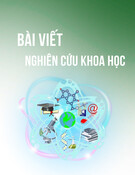

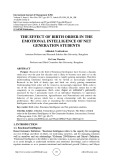
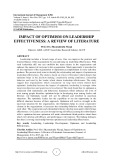
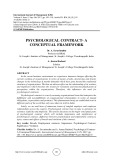
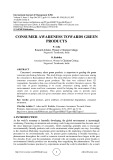
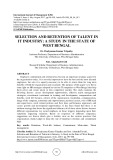

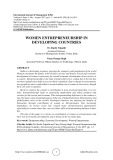
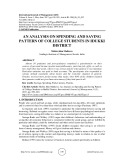
![Giáo trình Tâm lý học dạy học đại học [chuẩn nhất]](https://cdn.tailieu.vn/images/document/thumbnail/2026/20260203/hoahongdo0906/135x160/88251770175802.jpg)


![145 câu trắc nghiệm Tâm lý học đại cương: Bộ câu hỏi [năm hiện tại]](https://cdn.tailieu.vn/images/document/thumbnail/2026/20260127/hoahongcam0906/135x160/72471769497620.jpg)











